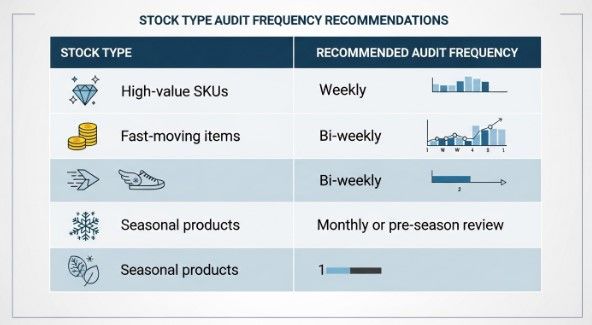How to Conduct a Cost-Effective Stock Audit in 5 Steps
July 31, 2025 | By Stockount

Why Strategic Inventory Audits Are a Game-Changer
Maintaining accurate inventory records is more than operational housekeeping—it’s a competitive advantage. A well-executed stock audit software aligns your physical inventory with your system records, revealing discrepancies that could cost you revenue, efficiency, or customer trust. Despite the importance, many businesses postpone audits over concerns about cost, disruption, or complexity. The good news? With tools like Stockount, a cost-effective audit that is lean, scalable, and precise is absolutely within reach.
Whether you’re overseeing a warehouse in the USA or running a worldwide e-commerce operation, this guide helps you conduct smarter audits without draining resources.
Step 1: Set Audit Objectives That Drive Value
Embarking on a stock audit without clearly defined goals often results in wasted effort and missed insights. Start by identifying key issues to resolve:
Is there a shrinkage problem?
Are your inventory records inaccurate, leading to poor stock replenishment?
Storage space that may be utilised more effectively is occupied by surplus or outdated inventory.
A lifestyle brand uncovered that 15% of its warehouse was filled with slow-moving, outdated SKUs, solely by classifying items based on turnover. Clear objectives allow for focused audits that cut down on wasted labor and deliver real results.
Step 2: Leverage Technology to Lower Costs and Boost Accuracy
Manual audits take a lot of time and are prone to mistakes. Automation is your ally.
Utilize:
Barcode scanning tools
RFID-based systems for real-time inventory tracking
Cloud platforms like Stockount to unify data and provide actionable insights
Hint: According to the RFID Journal, companies that use RFID report 99.9% inventory accuracy, compared to 63% for manual techniques. One electronics distributor in USA improved reconciliation speed by 40% by integrating Stockount's live scanning system.
Step 3: Transition to Cycle Counting for Seamless Audits
Instead of a disruptive full-year audit, consider Perpetual Audit software (Cycle Count), which involves spot-checking portions of your inventory at scheduled intervals.
Advantages include:
Minimal operational interruptions
Lower manpower requirement
Continuous inventory optimization
Recommended cycle frequency by stock type:

This segmented approach ensures constant accuracy and reduces audit fatigue.
Step 4: Train Your Team for Audit Success
Audit accuracy rests heavily on the capabilities of your team. Investing in proper training transforms your staff into precision-driven operators.
Training essentials:
Standard procedures for scanning and logging
Error detection and reconciliation strategies
SKU categorization frameworks
Success Story: A mid-sized tech company reduced audit errors by 35% after introducing dual-verification checklists for warehouse teams.
Step 5: Outsource When Scaling Demands Expertise
As your business expands, auditing becomes more complex. Partnering with a professional audit service can deliver speed, accuracy, and credibility.
Benefits of outsourcing:
Expert-led, rapid execution
Unbiased evaluations that uncover hidden inefficiencies
Enhanced transparency for financial reporting
Data-Backed Insight: Companies that outsource their audits typically see 26% fewer inventory discrepancies (source: InventoryOps). An apparel brand improved its seasonal stock turnover by 35% after outsourcing quarterly audits.
Bonus Tip: Use Visual Tools to Standardize the Process
Streamline your audit workflow with visual aids that make the process repeatable and transparent:
Design a flowchart outlining each step of the audit
Use iconography to signify inventory status, such as “Needs Review” or “Obsolete.”
Build custom checklist templates with fields for SKU, count, location, discrepancy, and comments
If you'd like, I can help you design a branded visual checklist or status guide aligned to Stockount's aesthetic.
Wrapping It Up
Strategic inventory audit system is not a burden; it is a growth tool. When paired with the right tools, training, and rhythm, your audits become smart systems that continuously refine your stock position. That means fewer surprises, better planning, and empowered decision-making.
With Stockount, your audits won’t just identify problems—they’ll unlock performance. Ready to take your next audit from reactive to proactive? Every day with manual audits costs you money. Experience how Stockount enhances accuracy while reducing audit costs by more than 50%. Book your free demo before your next audit cycle.
FAQs
1. What’s the best time to conduct a stock audit?
Off-peak seasons or weekends often work best. Consider syncing audits with financial quarter closings for added accuracy.
2. How do RFID systems improve audit efficiency?
RFID tags enable bulk scanning without line-of-sight. They speed up counts and improve reliability across large-scale inventories.
3. How often should a small business perform a cycle count?
Weekly checks for key SKUs and monthly reviews across inventory zones usually strike the right balance.
4. Are digital audit checklists better than paper?
Yes. They’re easier to store, analyze, and reference—especially when integrated into platforms like Stockount..
5. Can I outsource just a part of my audit?
Absolutely. Many firms offer modular auditing services—ideal for high-value zones, seasonal segments, or multi-warehouse operations.